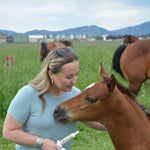Covid-19 and Your Horse
April 13, 2020

Some coronaviruses live in animals and some live in humans. The novel coronavirus causing COVID-19 has proven to be transmitted between species, as it has jumped from animals to humans, and as of this weekend, from humans back to animals.
Tiger King or Tiger Corona?
The USDA has confirmed that one tiger at a New York zoo has tested positive for COVID-19. They believe the tiger contracted COVID-19 from a zoo employee. Click here to read the press release: https://www.aphis.usda.gov/aphis/newsroom/news/sa_by_date/sa-2020/ny-zoo-covid-19.
What does this mean?
Unclear. This is the first known case of transmission from human to animal, so there is much to be investigated.
While there is no evidence that pets or livestock can spread COVID-19 infection to people, it is worth being extra careful until we all know more.
The USDA is now recommending people infected with COVID-19 to limit exposure to people AND animals.
What steps can I take to keep myself and my animals safe?
What we know about the novel coronavirus is evolving every day. Until we know more, we recommend the following safe practices:
- If you are sick, stay home and restrict your exposure to other people and animals.
- If you are healthy, stay home and restrict your exposure to other people and animals.
- To the best of your ability, care for and touch your animals ONLY.
- Wash your hands before and after contact with any of your animals, and if possible, between interactions with animals that live in separate environments.
- Limit your pets’ exposure to other animals.

Visit https://www.cdc.gov/coronavirus/2019-ncov/daily-life-coping/animals.html for the most up to date information.
Can FullBucket help?
Given that at least 80% of the immune system lives in the gut, focusing on gastrointestinal health is imperative always, but especially given current events.
Check out FullBucket’s range of probiotic supplements to support your horse, dog, and cat’s digestive health. Subscribe and save 20% on your purchase!
At FullBucket, we are committed to sharing new information as we learn more about the novel coronavirus. Here’s what we know now as we move into the third (or fourth!) week of quarantine:
What is a virus?
While every virus is a little bit different, in its simplest form, a virus consists of genetic material encased by a capsid, or shell.
Viruses must enter a host’s cell to survive and thrive.
Once a virus is able to move inside a cell, it uses the cell’s machinery to replicate and wreak havoc throughout the body.

Is the coronavirus new?
Yes and no. “Coronavirus” is a general name for a large family of viruses, which includes the common cold, SARS, and MERS.
The coronavirus is not new to the agricultural world either.
Livestock are commonly vaccinated intranasally for coronavirus, which can cause gastrointestinal and respiratory symptoms.
Bovine coronavirus is species specific, meaning that it is highly unlikely to spread to humans.
What is different about COVID-19?
Remember, we live in a world in which we are always surrounded by viruses, bacteria, mold, and other toxins.
Our health depends on a fully functioning immune system, which is largely connected to the gastrointestinal tract and the microbiome.
Feed and supplement yourself and your animals well!
As we head into a new week, we want to express gratitude to all of those essential workers, including farm help, maintenance, veterinarians, and other animal caretakers, in the FullBucket family.
Thank you for risking your own health and wellbeing to continue to serve us and our animals.
As always, please let us know how we can continue to support you and your furry friends during this time. We are here for you!

